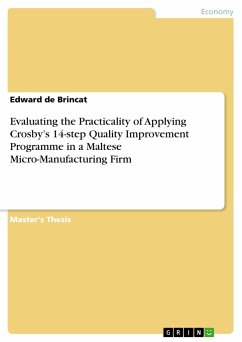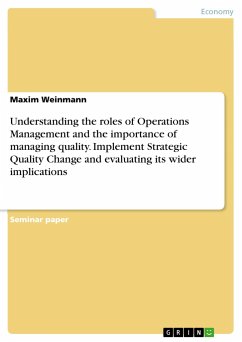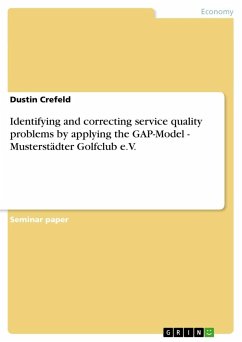Master's Thesis from the year 2012 in the subject Business economics - Business Management, Corporate Governance, grade: 80, University of Leicester, course: Master of Business Management - Quality Management, language: English, abstract: Executive Summary Manufacturing companies including a local micro-enterprise - Quality Postform Ltd are persistently facing competitive pressures as a consequence of customers demanding higher quality products. The emergence of Quality Management has been attributed by many researchers and Quality Gurus including Phil Crosby as a strategic imperative for typical organisations to survive within a highly competitive environment. Nevertheless, research carried out throughout the past years is relatively restricted regarding the practicality of micro-manufacturing firms in implementing Crosby's Quality Improvement Programme, which is claimed to be highly beneficial in typical situations. This dissertation seeks to investigate this scenario from both a descriptive and critical perspective towards Quality Postform Ltd. The research provides a critical evaluation of the academic contributions towards the quality management concept. Distinct disputed viewpoints have been identified focusing on Crosby's 14-Step Quality Improvement Programme. From one end of the spectrum, supporters uphold that claimed benefits have been acknowledged. Alternatively, others sustain that in essence a Quality Improvement Programme is counter-productive in terms of its application within Small and Medium sized Enterprises. However the researcher has identified four key pre-requisites in order for micro-firms to effectively implement Crosby's programme. These include: management commitment, the acknowledgement of a quality problem, the organisation's readiness to embrace change together with the suppliers' readiness to support the quality programme. The methodology applied to assess the presence of these four pre-requisites at QPL was to compile primary, qualitative data through one-to-one / face-to-face interviews with key management officials. This approach is justified due to the absence of formalised documentation and as a result, it is imperative to assess that historical data on Quality Systems is seriously lacking at QPL. The field research outcome reveals that QPL's management is experiencing serious doubts regarding the feasibility and practicality of the program's implementation within a micro-manufacturing firm. This is the case primarily whenever the latter is facing limited financial and human resource capabilities such as at QPL. The research findings disclose that none of the four pre-requisites are present within this micro-firm. [...]
Hinweis: Dieser Artikel kann nur an eine deutsche Lieferadresse ausgeliefert werden.
Hinweis: Dieser Artikel kann nur an eine deutsche Lieferadresse ausgeliefert werden.








